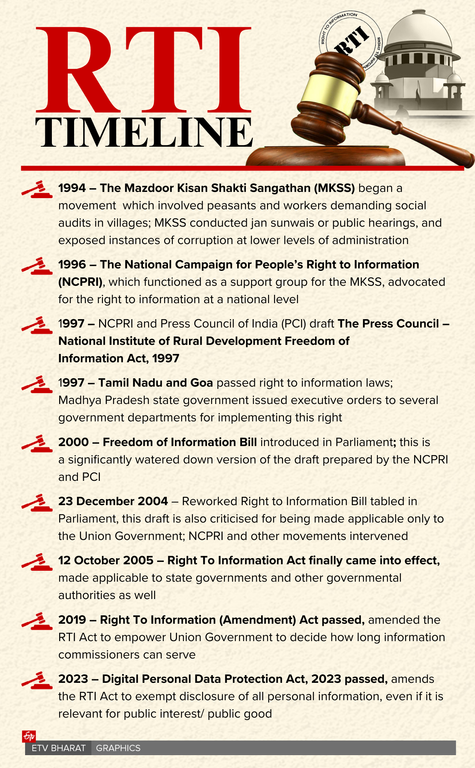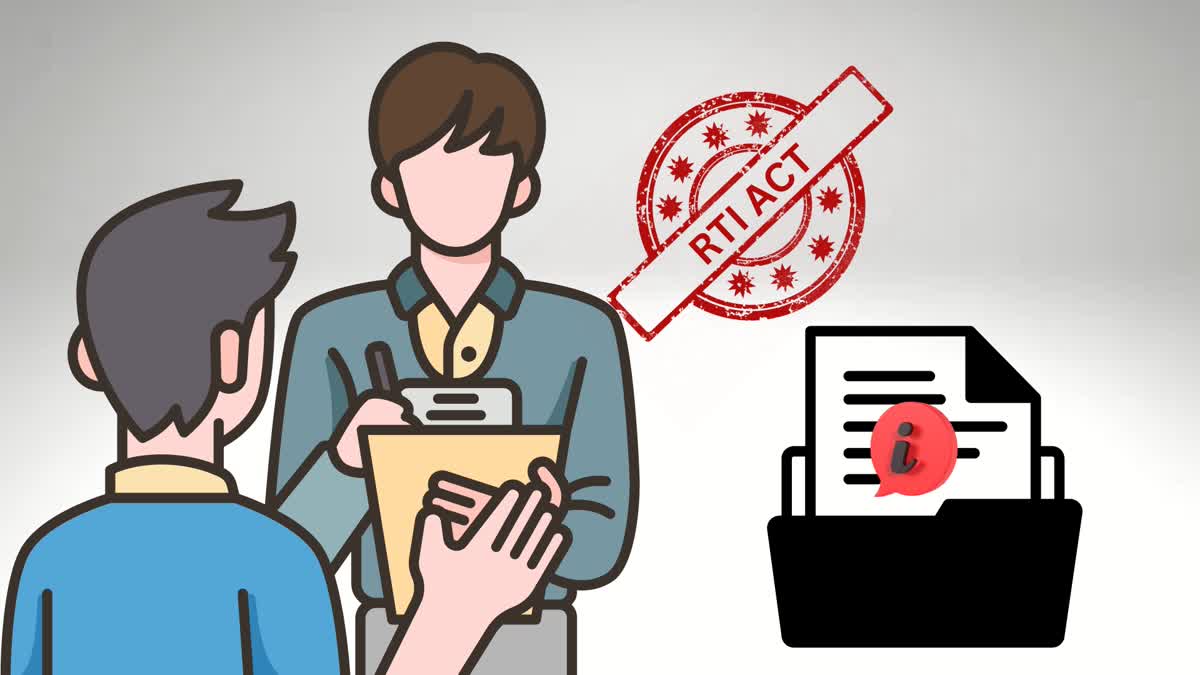An obvious sign of a thriving democracy is the ability of citizens to hold their governments accountable. Free and fair elections are the most manifest markers of keeping governments in check. During the intervening periods between elections, accountability is ensured through various other means, one of which is by the exercise of citizens' right to information.
Enforced largely through the Right to Information Act (RTI Act) which was enacted in 2005, India’s experience with the enforcement of this right has been mixed. The law has clocked in major achievements, while also losing out on some of its rigour in the years gone by.
THE BEGINNING OF A MOVEMENT…
The history of the freedom of information movement predates the enactment of law by some years. One of the earliest steps in this movement was taken in 1994 by the Mazdoor Kisan Shakti Sangathan (MKSS), a people's movement that began in Rajasthan. MKSS, spearheaded by prominent social activist Aruna Roy, was a movement by peasants and workers that demanded social audits in villages, and eventually exposed instances of corruption at the lower levels of administration.
The Sangathan deftly employed a direct technique to fight for the right to information – jan sunwais or public hearings. The seeds sown by MKSS eventually gave birth to the National Campaign for People's Right to Information (NCPRI) in 1996. This campaign functioned as a support group for the MKSS, and advocated for the right to information at a national level.
Helmed by prominent media persons, bureaucrats, and members of the bar and judiciary, the NCPRI along with other civil society movements and the Press Council of India, sent to the Government of India a draft right to information bill. Justice P.B. Sawant, former Supreme Court judge and then Chairman of the Press Council of India played a crucial role in drafting this bill, which was named the "The Press Council – National Institute of Rural Development Freedom of Information Act, 1997".
THE LONG ROAD TO THE RTI ACT, 2005…
In the run-up to the passing of a Union law on the right to information, several states took the lead in passing such laws. Tamil Nadu became the first Indian state in 1997 to pass a law on the right to information. A short law of only seven sections, the Tamil Nadu Right to Information Act, 1997 exempted disclosure of certain information, such as those relating to defence, international relations, confidential communication between Ministers and the Governor.
Goa also enacted a law on the right to information in 1997, while the Madhya Pradesh government issued executive orders to several government departments for implementing this right. The Supreme Court of India also pitched in with its progressive rulings, especially in the context of voters' rights.
The Association for Democratic Reforms had initiated litigation in the Delhi High Court seeking transparency in the electoral process by mandating that candidates disclose their criminal records, assets, liabilities, and educational qualifications. This matter eventually reached the Supreme Court resulting in the landmark ruling of Union of India vs. Association for Democratic Reforms [(2002) 5 SCC 294].
The Supreme Court held that the voters’ right to know about the candidates is an integral part of the fundamental right to freedom of speech and expression under Article 19(1)(a) of the Constitution. The Court affirmed that the Election Commission of India has the authority to issue directives to ensure free and fair elections, including requiring candidates to disclose their criminal records, assets, liabilities, and educational qualifications.
Meanwhile, a Freedom of Information Bill was introduced in Parliament in 2000. This was a significantly watered down version of the draft prepared by the NCPRI and PCI. This compelled the NCPRI to formulate amendments to this draft, which were eventually shared with the now-abolished National Advisory Council. Eventually, the Right to Information Bill was tabled in Parliament by the UPA government on 23 December 2004.
This draft also attracted criticism – the version tabled in Parliament was applicable only to the Union Government. After intervention from the NCPRI and other movements, the Act was made applicable to state governments and other governmental authorities as well, and finally came into effect as law from 12 October 2005.

THE HITS...
Time and again, the Supreme Court has utilised Article 19 of the Constitution, which guarantees the right to freedom of speech and expression, to also ensure that citizens have a right to know. The RTI Act, 2005 gives practical effect to this right, and establishes the pathway through which citizens can secure access to information which is under the control of public authorities.
The Act defines both terms – "information" and "public authority" – broadly. Information is defined to include any material in any form, including records, documents, memos, e-mails, opinions, advice, press releases, circulars, orders, logbooks, contracts, reports, papers, and data material held in any electronic form.
It also included information relating to any private body which a public authority is legally permitted to access. Public authority means any authority/body/institution which is established under the Constitution, or by means of a law or executive notification. The term also includes any body or non-governmental organisation which is substantially financed by the government (either through direct or indirect funds).
The provisions of the RTI Act have been put to good use, as evidenced by the high-profile instances of corruption that it helped to uncover. The National Alliance of Peoples' Movement, led by Medha Patkar, played a pivotal role in exposing the Adarsh Housing Society scam that involved serious violation of rules concerning land ownership.
This was done by filing RTI requests as well as complaints with the Department of Defence, the Maharashtra Government as well as other state authorities. A RTI request filed by a non-profit organisation called Housing and Land Rights Network also led to the unearthing of the embezzlement which occurred in the Commonwealth Games of 2010.
THE MISSES…
Simultaneously, however, the RTI Act has received certain setbacks as well. In 2019, the Act was amended to give the Union Government unilateral power to decide how long information commissioners, who hear appeals against unsatisfactory responses to RTI requests, can serve.
Prior to this amendment, information commissioners had a fixed tenure of five years, or till the attainment of 65 years of age, whichever is earlier. This was a direct affront to the independence of the information commissioners' offices. More recently, changes were brought about to the RTI Act through the Digital Personal Data Protection Act, 2023 (DPDP Act).
The RTI Act does have its share of exceptions, and allows certain information to be kept confidential for reasons related to national security and sovereignty. The RTI Act also prohibits disclosure of personal data of citizens by the government, unless there is an overriding public interest. The DPDP Act has amended this qualified prohibition into a total prohibition. RTI activists, including the NCPRI fear that this blanket ban on disclosing personal information could potentially be used by public officials to refuse disclosures and evade accountability.
WHAT LIES AHEAD…
Despite the RTI Act's wings having been clipped through some legislative interventions, the successes of the law have been quite astounding. It has been effective in tackling both low-level corruption and unveiling high-profile scams. The RTI Act is a potent tool in the hands of the citizens, and when put to good use, can ensure much-needed accountability in governance. One hopes that the RTI Act goes from strength to strength, and bolsters good governance in India.
(The writer would like to thank Shanjali Gupta, a fifth-year student of the Guru Gobind Singh Indraprastha University, for her research assistance)



